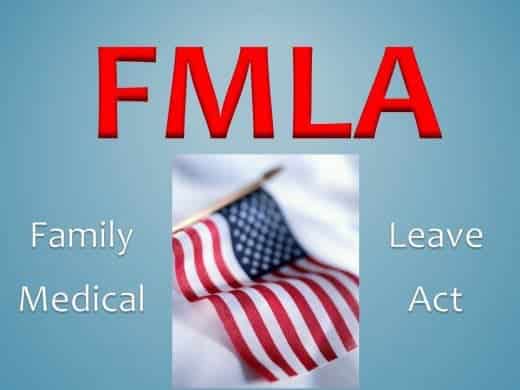Family and Medical Leave Act (FMLA)
Many people feel that it is illegal to terminate an employee who missed work due to illness. While this may be true some of the time, it is not always the case. Only those employees who qualify under the Family and Medical Leave Act (FMLA) have job protection while off due to illness. The FMLA provides eligible employees with up to twelve (12) weeks of unpaid leave per year. It also requires that an employee’s group health benefits be maintained during the leave and requires that an employee is returned to their same or an equivalent job at the end of their FMLA leave.
Eligibility
However, not all employees are eligible. To be eligible for FMLA leave an employee must have worked for the employer for at least one (1) year and during that year the employee must have worked at least one thousand two hundred fifty (1,250) hours within the last twelve (12) months. But that is not where the analysis ends. Not all employers are required to offer FMLA leave to their employees. A covered employer for purposes of the FMLA is one who employs fifty (50) or more employees for at least twenty (20) work weeks in the current or preceding calendar year – including joint employers and successors of covered employers. If the employer has less than fifty (50) employees or if the employee has not worked for at least one year, the Family Medical Leave Act does not apply.
Assuming the above requirements are met, an employee is entitled to FMLA leave in the following situations:
- For the birth of a son or daughter;
- For the placement of a child for adoption or foster care;
- To care for an immediate family member, which includes a spouse, child or parent, suffering from a serious medical condition;
- When an employee is unable to work due to a serious health condition;
- For any exigency arising out of the fact that the employee’s spouse, son, daughter or parent is a military member on covered active duty or called to covered active duty status;
Employer Obligations
Employers have numerous obligations under the Family and Medical Leave Act. Every covered-employer is required to post a notice explaining the FMLA. This notice must set forth the employees’ rights and responsibilities under the FMLA and must also include the procedures for filing complaints with the Wage and Hour Division of the Department of Labor. Employers may be fined for failure to provide notice.
It is important to note that an employee requesting leave for the first time is not required to specifically mention the FMLA. Rather, when an employer acquires knowledge that employee’s leave may be for an FMLA-qualifying reason, the employer must notify the employee of the employee’s eligibility to take FMLA leave within five (5) business days. The employer can also request for certification from the employee’s health care provider. If such a certification is requested, the employee must be given fifteen (15) days to complete the form.
Employee Obligations
Of course, employees have certain responsibilities under the FMLA as well. When an employee has knowledge of his or her need for leave, the employee is required to provide thirty (30) days notice. However, if the reason for the leave is not foreseeable, then the notice must be given as soon as practicable. For planned medical treatment, an employee is required to consult with his or her employer to avoid unduly interfering with the employer’s business. It is also important to keep in mind that an employer can condition the leave upon an employee’s compliance with the employer’s usual and customary procedures. In Srouder v. Dana Light Axle Mfg., LLC, 725 F.3d 608 (6th Cir.2013), the Sixth Circuit rejected the plaintiff’s FMLA claim and held that the employer was justified in terminating the employee after the employee failed to adhere to the call-in procedures of the employer’s attendance policy.
Most litigation over the FMLA stems from claims that an employer either unlawfully denied FMLA leave or retaliated against an employee who exercised his or her FMLA rights. An employee has two (2) years to file a lawsuit if he or she believes the employer engaged in unlawful conduct. The statute of limitations can be extended to three (3) years if the employee is able to prove that the violation was willful. Although an employee may choose to file a complaint with the Department of Labor, this is not required and an employee may proceed immediately to court. Both Federal court and State court have jurisdiction to hear FMLA claims. An employee who prevails on an FMLA claim may be entitled to back pay, liquidated damages, reasonable attorney’s fees and costs and other equitable relief which could include reinstatement.
The Family Medical Leave Act is not as simple as it seems
Although the Family Medical Leave Act seems like it is pretty straightforward, nothing could be further from the truth. An employer who fails to strictly comply with the provisions of the Act could find itself subject to significant penalties and damages. Likewise, an employee who fails to provide proper notice, documentation and/or complies with the employer’s usual and customary practices could not only have their FMLA request denied, that employee might also be out of a job. https://www.dol.gov/general/topic/benefits-leave/fmla
To learn more about the Family and Medical Leave Act and how it affects you, contact the expert attorneys at Dworken & Bernstein and find out your options today!
In Lake County, call 440.946.7656
In Cuyahoga County, call 216.861.4211







